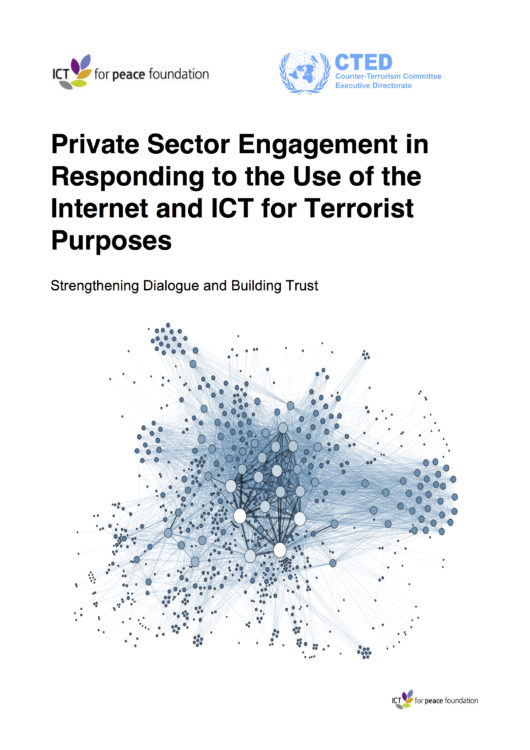
On the occasion of the Special Meeting of the Security Council Counter-Terrorism Committee held in New York on 1-2 December 2016, ICT4Peace and the UN Counter Terrorism Executive Directorate (UNCTED) presented an initial report on the findings of a joint project on ‘Private Sector Engagement in Responding to the Use of the Internet and ICT for Terrorist Purposes: Strengthening Dialogue and Building Trust’.
The report can be accessed here.
The UN CTED on 30 November 2016 also organised a Panel Discussion: (Session IV) Preventing the Exploitation of Information and Communications Technologies for Terrorist purposes, while Respecting Human Rights and Fundamental Freedoms (30 Nov 2016).
Moderator: Ambassador (ret.) Daniel Stauffacher, Founder and President, ICT4Peace Foundation Rapporteur: CTED Panellists:
- Mr. Steve Crown, Vice President and Deputy General Counsel, Microsoft
- Mr. Brian Fishman, Facebook
- Ms. Alexandria Walden, Public Policy & Gov’t Relations Counsel, Google Mr.
- Miguel Sanchez, Telefonica
- Ms. Maryam Mujica, Twitter
- Prof. Hany Farid, Professor of computer science, Dartmouth College
The recording of this session can be found here.
The Joint UNCTED-ICT4Peace project
The first phase of the joint UNCTED-ICT4Peace project (April to December, 2016) focused on convening a broad number of stakeholders for initial consultations on existing and emerging threats relating to the use of the internet and ICT for terrorist purposes; industry approaches to responding to terrorist use of the internet and ICT and emerging principles, standards and practices shaping that response; trends in multi stakeholder and public-private engagement in responding to terrorist use of ICT; and mechanisms/ platforms for information exchange and sharing of lessons/ practice on the industry response to terrorist use of the internet and ICT.
The consultations were carried out through a series of workshops held in Geneva, Zurich, California and Kuala Lumpur and involved representatives from technology and social media companies, the telecommunications and financial sectors, civil society, and inter-governmental agencies.
The project findings point to the emergence of a voluntary policy framework guiding private and public action in responding to online terrorist content and activity. The voluntary framework recognizes the importance of enhancing public safety with actions that remain anchored in the rule of law, protecting and respecting human rights and core principles such as transparency, accountability, predictability and remedy. At the same time, the consultations laid bare that there is a risk that this emerging policy framework may be undermined by some of the measures that are being taken in response to public security concerns posed by the growing incidence of terrorist use of the internet.
Evidently, it is impossible to ignore the public security challenges relating to online terrorist activity and content. At the same time, and as they move to respond to online terrorist content and activity, both public and private actors should consider the longer-term prevention benefits of ensuring that the core principles that form the basis of the emerging policy framework are respected.
A number of policy and programmatic level recommendations were the result of this first phase of the project and include the following:
- Building on existing initiatives, promote stronger and more sustainable dialogue and information exchanges between private sectors actors (e.g. between technology and social media companies and the financial sector), and between the private sector and governments and civil society.
- Support dialogue around and consolidation of the emerging global policy framework.
- Encourage coordination of effort, particularly among inter-governmental organisations and between these organisations and the private sector
- Strengthen the links between OFFLINE and ONLINE efforts to prevent and counter terrorism, and reinforce the importance of context when developing and implementing policy.
- Develop a global mechanism for knowledge and information sharing.
- Invest in empirical, policy-relevant research, particularly with regard to assessing the impact or effectiveness of existing and emerging approaches to content management and counter-narrative efforts.
- Raise awareness and build capacity of smaller companies and other key stakeholders.
- Promote greater investment in and support of critical thinking and media/digital literacy efforts.
A second phase of the project will commence in January 2017, with the publication of the three workshop reports and a series of short policy briefs on issues discussed during the different workshops held to date.
The project is lead by Dr. Camino Kavanagh, Senior Advisor, ICT4Peace and Mr. Marc Porret, Legal Advisor, UNCTED, with the support of project researchers and associates Adam Hadley, Sophia Khan and Diana Ruiz for ICT4Peace and Matteo Sestito and Katie Wilson for UNCTED.
Coverage of the special CTC session during which the project was launched can be accessed here.
